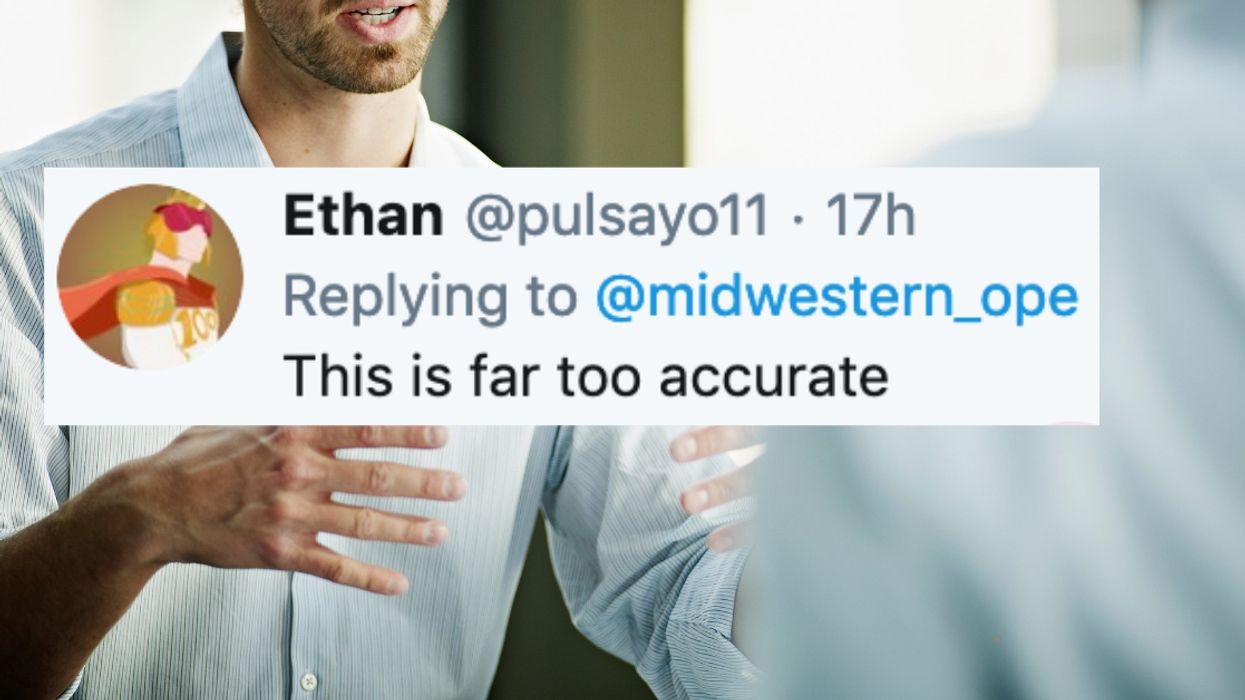Even when they're speaking the same language, people from different regions can have pretty different ways of speaking. Sometimes that just means they pronounce words a little differently or use different slang.
Sometimes, though, it can mean that words have completely different meanings.
Depending on what part of the country they grew up in, Americans call the sweet combination of flavored syrup and carbonated water enjoyed the world over anything from "soda pop," "pop," or "soda" to "Coke" (no matter what brand or flavor of the drink one is referring to).
Similarly, "soda" can either be a flavored soft drink or plain soda water.
Along this vein, things get even more complicated when you start combining words into phrases.
Most english speakers are going to be familiar with what the words "no" and "yeah" mean, but if you're in the Midwest US (and a few other areas of the country), things get a bit weird when you start putting the two words together.
@midwestern_ope posted the following helpful guide to twitter in an effort to help those of us not from the area make sense of things.
There were many comments from people relating to the post.
There was some disagreement over whether the turns of phrase were exclusive to the midwest.
California, Pennsylvania, and New England also laid claim to them.
A few people added on to the translation.
English is a complicated language (all the more so if it isn't your first one), and it can get a bit confusing. If you're ever having a hard time deciphering a midwesterner's response to a question, just refer back to @midwestern_ope's handy guide!








 The Benny Show
The Benny Show





 @neilforreal/Bluesky
@neilforreal/Bluesky @savannahcat/Bluesky
@savannahcat/Bluesky @qadishtujessica.inanna.app
@qadishtujessica.inanna.app @v-ron/Bluesky
@v-ron/Bluesky @nelnelnellie/Bluesky
@nelnelnellie/Bluesky @beatlenumber9/Bluesky
@beatlenumber9/Bluesky @pinkzombierose/Bluesky
@pinkzombierose/Bluesky
 @theunobsolete/TikTok
@theunobsolete/TikTok @theunobsolete/TikTok
@theunobsolete/TikTok @theunobsolete/TikTok
@theunobsolete/TikTok @theunobsolete/TikTok
@theunobsolete/TikTok @theunobsolete/TikTok
@theunobsolete/TikTok @theunobsolete/TikTok
@theunobsolete/TikTok @theunobsolete/TikTok
@theunobsolete/TikTok @theunobsolete/TikTok
@theunobsolete/TikTok @theunobsolete/TikTok
@theunobsolete/TikTok @theunobsolete/TikTok
@theunobsolete/TikTok @theunobsolete/TikTok
@theunobsolete/TikTok @theunobsolete/TikTok
@theunobsolete/TikTok @theunobsolete/TikTok
@theunobsolete/TikTok @theunobsolete/TikTok
@theunobsolete/TikTok @theunobsolete/TikTok
@theunobsolete/TikTok @theunobsolete/TikTok
@theunobsolete/TikTok @theunobsolete/TikTok
@theunobsolete/TikTok
 @laysuperstar/TikTok
@laysuperstar/TikTok @laysuperstar/TikTok
@laysuperstar/TikTok @laysuperstar/TikTok
@laysuperstar/TikTok @laysuperstar/TikTok
@laysuperstar/TikTok @laysuperstar/TikTok
@laysuperstar/TikTok @laysuperstar/TikTok
@laysuperstar/TikTok @laysuperstar/TikTok
@laysuperstar/TikTok @laysuperstar/TikTok
@laysuperstar/TikTok @laysuperstar/TikTok
@laysuperstar/TikTok @laysuperstar/TikTok
@laysuperstar/TikTok @laysuperstar/TikTok
@laysuperstar/TikTok @laysuperstar/TikTok
@laysuperstar/TikTok @laysuperstar/TikTok
@laysuperstar/TikTok @laysuperstar/TikTok
@laysuperstar/TikTok @laysuperstar/TikTok
@laysuperstar/TikTok